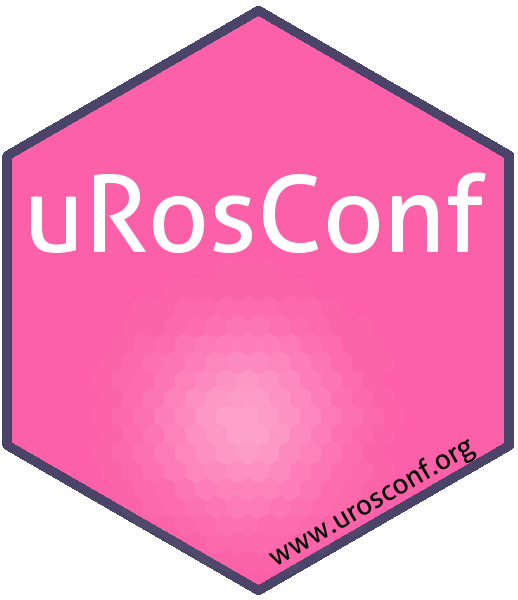The R Project - The Use of R in Official Statistics - uRos2023
Visit this website regularly for updates or follow us on Twitter.
uRos2023 on-site event 12-14 December 2023
The annual conference on the Use of R in Official Statistics will be
organized as an on-site event at its home country and institution -
Romanian National Statistics Institute, on 12-14 of December 2023.
Details about the format and the programme will be announced soon.

Over the last two decades R has become the lingua franca for statisticians, methodologists and data scientists worldwide. The reasons why the official statistics community is rapidly embracing R are clear: it has an active worldwide community of users, there is wide support from the industry and it combines a vast amount of functionalities for data preparation, methodology, visualisation and application building. Moreover, R-based software is exchanged through strictly enforced technical standards: “R is probably the most thoroughly validated statistics software on Earth.” – Uwe Ligges, CRAN maintainer (useR!2017).
Finally, R is a free (libre) Open Source software product, making it an ideal environment for sharing, collaboration and industrialising official statistics.
The annual event “use of R in Official Statistics” started as a local conference at the Statistical Office of Romania in 2013, with the first international edition being held at that same office in 2014. In 2018, Statistics Netherlands hosted the sixth edition of this event, which brought together official statisticians, scientists, and prominent members of the R community to share ideas on using and developing R tools in the area of official statistics.
In 2020, was Statistics Austria’s turn to host the conference, for the first time being a virtual event. In 2021, uRos was hosted by its home country and institution - Romanian National Statistics Institute.
A decade of uRos events was celebrated by the first non-European uRos, hosted by Statistics Canada, as a virtual event in December 2022.
Now that the pandemic is off, we are delighted to invite you to uRos2023 (11th edition) at its home country and institution - Romanian National Statistics Institute, on 12-14 of December 2023.
Abstracts
You can browse all the accepted abstracts at https://uros.hopto.org/.
Download the book of abstracts: book-of-abstracts-uros2023-draft-v1.pdf
Important dates
- Abstracts and tutorials submissions deadline:
8th of September 2023September 29, 2023
- Notification of acceptance:
6th of October 2023October 13, 2023
- Scientific conference: December 12–14, 2023
- Journal paper submission deadline: January 15, 2024
Keynote Speakers
Mark van der Loo
Mark van der Loo obtained
his PhD in Theoretical Chemistry in 2008 from Radboud University in Nijmegen
(NL). He is currently a Senior Methodologist at Statistics Netherlands (CBS) and a
Research Fellow at the Leiden
Institute for Advanced Computer Science (LIACS) of the University of
Leiden. His main research interest is Statistical Computing in the
broadest sense. Mark has published popular R packages and articles in
the area of statistical data cleaning, fuzzy text matching, unit
testing, and more. Together with Edwin de Jonge he published Statistical
data cleaning with applications in R with Wiley Scientific
publishers (2018). Mark is also a member of the editorial board of the
R Journal.
Besides doing research, he coordinates the substantive curriculum of the
internal CBS Academy, and the CBS participation in the EMOS and ESTP programs. In
Leiden he collaborates with the Network Science group to develop methods
and algorithms for disclosure control of (social) network data.

“Modernizing Statistical Production Systems Using R”
Abstract: It is widely known that National Statistical Offices have
are facing challenges both in the area of data collection and output
production. On the input side, NSIs are increasingly relying on volatile
data sources including administrative data, sensor data, web data and
other big data sources, and (in the future) data from private sources.
On the output side NSIs are increasingly expected to quickly respond to
current events and needs in society.
These trends put considerable strain on the statistical production
chains of NSIs. Considering the increasing volatility, NSIs need to move
from a situation where production chains are static over time, to a
situation where change and innovation is the norm. Production systems
will be permanently under construction.
One way to cope with this situation is to build production systems using
a modular approach. Although this idea is hardly new, the question of
module granularity, which functionality a module should offer (and which
not) remains largely undiscussed in the official statistics
community.
In this talk I will discuss what I have learned about this approach over
15 years of R package development. It turns out that figuring out where
a module starts and where it ends is surprisingly difficult. I will
highlight technical issues as well as issues related to design, modulde
development and the user perspective. Finally, I will highlight
properties of the R language that make it especially suitable for a
modular approach.
Isabella Gollini
Dr Isabella Gollini is an Assistant Professor in Statistics at the
UCD School of Mathematics and Statistics, where she is teaching Bayesian
Statistics, and Data Programming with R to hundreds of students each
year.
Isabella is Associate Editor for the Journal of Statistical Software and
The R Journal.
Isabella works closely with scientists with different expertise in order
to yield high-impact practical results as well as developments of
statistical methods and software packages. In particular, her research
concerns the development of modelling and computational approaches for
complex data arising in various contexts such as social networks,
natural hazards, and geospatial analysis.
She is active in organising national and international events to promote
diversity in the Statistics, Data Science, Network Science, and R
communities. She is mentor at R-Ladies and was teaching leader at
Forwards the R Foundation taskforce on women and other under-represented
groups in 2017-2020.

“Programming and collaborations: roles and tools when using R.”
Abstract: Programming is a crucial part of a data scientist’s job and
it is generally a collaborative endeavour. We may collaborate for many
different reasons such as new applications, or to develop new methods,
improve efficiency in existing methods, apply or create some
user-friendly package software or interface.
In this talk, I will go through some of the main aspects associated to
the different roles that we can assume when collaborating in
programming. I will then focus on the tools we can use to organise and
share our projects in the context of R programming.
Programme
12th of December: Tutorials
13th of December: Welcome message & Keynote speaker 1 & Sessions
of presentations
14th of December: Keynote speaker 2 & Sessions of presentations
& Closing remarks
Download the agenda, in brief: uRos2023_Agenda_brief_v3.pdf
Download the agenda, in detail: Detailed_agenda_uRos2023_v2.pdf
Register
Conference registration fee 200 EUR.
The Participant registration fee includes:
* participation Certificate;
* entrance to all sessions;
* conference materials;
* coffee breaks & lunch;
* official dinner.
The payment details for EU and non-EU participants will me made
to:
Universitatea Ecologica din Bucuresti
Bd. Doinea Cornea, nr. 1G, sector 6, 061341, Bucuresti, Romania
VAT: 10240221
Bank: Groupe Societe Generale - Sucursala Academiei
Bank address: Bd.Ion Mihalache nr. 1-7, sector 1, 011171,
Bucuresti
IBAN (EURO): RO80BRDE410SV22843654100
SWIFT code: BRDEROBU
Please state the name of the registered conference participant
beneficiary of the payment and conference identifier code: UROS2023.
In order to confirm the payment of the Conference Fee we are kindly requesting that you send a scanned copy of the Bank Transfer Order, as a attached file (PDF or image file), by e-mail: anamaria.ciuhu [at] insse.ro
Call for abstracts - presentations
We are cordially inviting you to submit papers to and attend the
International Conference The Use of R in Official Statistics –
uRos2023 until 8th of September 2023 September 29,
2023.
There will be two kind of presentations “regular presentations” with roughly 15 minutes time slots and “lighting presentations” with 5 minutes time slots. Please indicate your preference, but the scientific committee will finally assign the presentations into the two categories.
The purpose of the conference is to provide a public forum for researchers from academia and institutes of official (government) statistics to present, exchange ideas and discuss developments in state-of-the-art statistical software commonly used in applied economics and statistics. The most focused debates are expected to be on the use of R in Official Statistics.
The topics covered by the conference are the following:
- Using R in new data sources
- Sampling and estimation
- R in organization
- Data cleaning
- R in production: data analysis
- Methods for official statistics
- Machine learning and AI
- Time series
- Report and GUI programming
- R in production: automation
- NLP in official statistics
- Disclosure control, dissemination and visualization
The participants are kindly asked to submit the abstract via e-mail to: urosconf [at] gmail.com preferably as plain text or Word or PDF, there is no template for the abstract submission.
Call for abstracts - tutorials
Tutorials will be 2 to 4 hours in length (1 slot is 2 hours). Tutorials will be presented as live presentations. The scope of the tutorials comprises the whole statistical production process of official statistics. Deadline for tutorial submission is 8th of September 2023.
Papers for Special Journal Issues
Authors with an accepted abstract can submit a full-length paper for one of the following journals: R Journal (special section) or Romanian Statistical Review (special issue).
Submissions for R Journal: : Mark van der Loo, mpj.vanderloo [at]
cbs.nl
- submission deadline will be January 15, 2024.
Submissions for Romanian Statistical Review: Ana Maria Ciuhu,
anamaria.ciuhu [at] insse.ro
- submission deadline will be January 28, 2024.
R Journal
A selection of papers will be published in a special section of R Journal. Publications are subjected to passing the standard peer review process. Please make sure to follow the R Journal author guidelines.
Papers should be submitted no later than 15 January 2024 to the R Journal special section’s Editor-in-Chief, Mark van der Loo via e-mail to: mpj.vanderloo [at] cbs.nl
The R Journal is the open access, refereed journal of the R project for statistical computing. It is run under the auspices of the R Foundation, and editors of the Journal are appointed by the board of the Foundation.
Romanian Statistical Review
A maximum of ten selected research papers will be published in a special issue of the Romanian Statistical Review. Publications are subjected to passing the standard peer review process. Please make sure to follow the RSR author guidelines.
Papers should be submitted no later than 28 January 2024 via e-mail to: anamaria.ciuhu [at] insse.ro
The Romanian Statistical Review is included in the Web Of Science Core Collection - Emerging Sources Citation Index (ESCI), a Clarivate Analytics database. It aims to provide a favourable space for exchange of ideas and a challenge at the same time. Any paper that can contribute to the understanding of statistics as a science is welcome. It is open-access without any fees.
Organisation
Organizing committee
- Ana Maria Ciuhu (Statistics Romania and Institute of National
Economy, Romanian Academy)
- Bogdan Oancea (Statistics Romania, University of Bucharest)
- Ciprian Alexandru (Ecological University of Bucharest)
- Alexander Kowarik (Statistics Austria)
- Mark van der Loo (Statistics Netherlands)
Scientific Board
- Tudorel Andrei (President, National Institute of Statistics -
Romania)
- Matthias Templ (ZHAW school of engineering, Switzerland)
- Adrian Dusa (University of Bucharest, Romania)
- Kazumi Wada (Ministry of Internal Affairs and Communications,
Japan)
- Marcello d’Orazio (Italian National Institute of Statistics - Rome,
Italy)
- Valentin Todorov (UNIDO, Vienna Austria)
- Alina Matei (University of Neuchatel, Switzerland)
- Bernhard Meindl (Statistics Austria, Austria)
- Edwin de Jonge (Statistics Netherlands, The Netherlands)
- Gergely Daróczi (RX Studio, USA/Hungary)
- Kamarul Ariffin Mansor (MARA University of Technology,
Malaysia)
- Marius Nicolae Jula (University of Bucharest, Romania)
- Matyas Meszaros (Eurostat, Luxemburg)
- Mihaela Paun (University of Bucharest)
- Roxana Adam (University of Bucharest, Romania)
Contact
We look forward to meet you in person at the premises of Romanian
NIS!
Conference venue: Statistics, 16 Libertatii Bvd., Bucharest 5,
ROMANIA
The conference secretariat can be reached via: urosconf [at]
gmail.com
Secretariat members
Ana Maria Ciuhu, National Institute of Statistics, Romania
Roxana Petcu, The Bucharest University of Economic Studies &
National Institute of Statistics, Romania
Code of Conduct
Organisers, speakers, registered participants, and sponsors of the uRos conference and/or unconfUROS hackathon, as well as persons or organizations following and discussing the conference through (social) media or internet are required to follow this Code of Conduct. We shall refer to the combined group as ‘participants’ of the uRos conference.
Privacy: participants respect each other’s privacy. In particular it is not allowed to systematically gather information on organisers, speakers and (registered) participants, including but not limited to personal life, professional position, political views, social media outings, open source contributions, or pictures.
Open: participants are open to collaboration, whether it’s on projects, working groups, packages, problems, or otherwise. Participants are receptive to constructive comment and criticism, as the experiences and skill sets of other participants contribute to the whole of our efforts. Participants are accepting of anyone who wishes to take part in their activities, fostering an environment where all can participate and everyone can make a difference.
Respectful: participants are respectful of others, their positions, their skills, their commitments, and their efforts. They are respectful of the volunteer efforts that permeate the R community. In the case of disagreement, participants are courteous in raising their issues. Participants are attentive in communication, whether in person or online, and tactful when approaching differing views. They refrain from demeaning, discriminatory, or harassing behaviour and speech.
Considerate: participants are considerate of their peers — fellow uRos participants. They are thoughtful when addressing the efforts of others, keeping in mind that oftentimes the labour was completed simply for the good of the community.
In case of violation, participants may be removed from the premises or blocked from communication with the organization. Where relevant, the proper authorities or organizations will be informed of inappropriate behaviour.
References
This code of conduct is based on the R Community Code of Conduct by the R consortium
GDPR terms and conditions
This chaptersets out the terms and conditions between organisers and you when you register as a participant for this conference and you are agreeing to comply with these terms and conditions.
Please read these terms and conditions carefully.
DECLARATION OF CONSENT
I hereby give my consent for organisers to collect, process and use my personal data for the purposes related to my participation to uRos Conference events and for any other use to which I have consented. The data that can be collected consist of:
- Name, surname, academic degree, institutional affiliation, e-mail address;
- Photos from the conference that might include my person;
- Videos from the conference that might include my person;
- Abstracts and slides from presenters to be published on the conference’s website.
USE OF PERSONAL DATA
Organisers will not sell your personal data.
The processing of the respective personal data involves communication
with the authors in order to publish the studies, publication of the
accepted studies in journals and indexation of the journal in
international databases.
I hereby give my consent to organisers to use my personal data for the
following purposes:
- to receive email communication about uRos Conference events;
- to use my images and videos in which I may be photographed or filmed by the organiser’s photographer and/or cameraman in promotional or event related materials by organisers.
The usage of my personal data must comply with the requirements of the Regulation (EU) 2016/679 of the European Parliament and of the Council of 27 April 2016 on the protection of natural persons about the processing of personal data and on the free movement of such data (“GDPR“).
PERSONAL INFORMATION
You can ask organisers at any time to have an unrestricted access to
your personal data and exercise your rights to: consult, modify, erase,
export your personal information, by sending a message to the conference
secretariat e-mail: urosconf [at] gmail.com.
You will find all data protection information (name and address of
Romanian National Institute of Statistics as controller within the
meaning of the GDPR, name and address of the data protection officer of
Romanian National Institute of Statistics as well as information on the
data protection rights and rights of complaint to which you are
entitled) in the data
protection information about this website.
Organisers
- National Institute of Statistics - Romania

- Ecological University of Bucharest

Live
This page contains agenda, real-time and important information during
the conference:
https://r-project.ro/conference2023-live.html
 |
